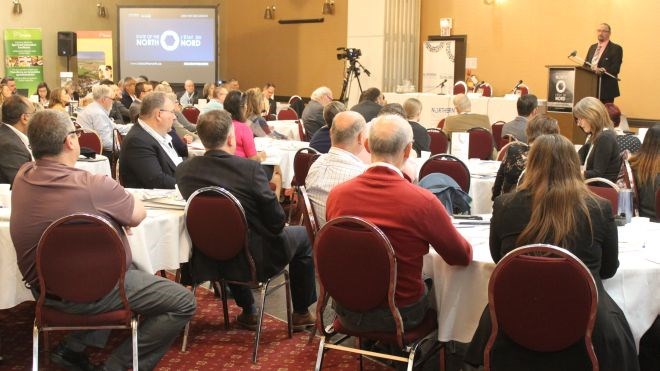Any resource development that takes place in the Far North needs to happen with both Indigenous and non-Indigenous people providing input and working together, said Jonathan Solomon, grand chief of the Mushkegowuk Council.
That’s the message he brought as a keynote speaker to State of the North, the annual conference hosted by the Northern Policy Institute, held Sept. 27 to 29 in Timmins.
“As we talk about the state of the North, the First Nations that I represent have to be part of any movement as we move forward so we can say that we did it,” he said.
“We did it in unison, working together; that's very important."
Solomon leads a tribal council that represents seven member communities, including Attawapiskat First Nation, Chapleau Cree, Fort Albany First Nation, Kashechewan First Nation, Missanabie Cree, Moose Cree First Nation, and Taykwa Tagamou First Nation (formerly New Post).
Land agreements between Mushkegowuk and the provincial government fall under Treaty #9, through which the parties negotiated issues like revenue sharing, consultation, child welfare, health and education.
Yet, Solomon said, a failure by the province to keep those promises have resulted in poor living conditions and a lack of opportunities for their citizens.
“For far too long, our people have become second-class citizens in their own backyard and that’s not fair,” he said.
Solomon said as interest in developing the North ramps up, there is ample opportunity for Indigenous and non-Indigenous people to work together to benefit from economic development initiatives.
Rather than position themselves as adversaries, he advocates for sitting together at the table so everyone benefits.
This could mean joining together on educational and health-care initiatives, tourism opportunities, or resource development projects.
Most important for the Mushkegowuk people is consent, and being giving a voice about — and a chance to participate in — the projects emerging in their own territory.
“There is diversity in Northern Ontario, diversity that shouldn’t impact our relationship, but give us strength to feed off of each other, to support one another, to assist one another,” Solomon said.
“We can take advantage of our diversity; that’s important.”
Mushkegowuk people are still people of the land, he said — Mushkegowuk translates to “people of the swampland” in English — and so they will still raise concerns about any negative impacts that could come up in the development process.
But in general, he said, First Nations are willing to work with industry so they can benefit from any projects coming their way, such as the Ring of Fire chromite project, or the opening of an all-season road, which will open the North up to more development.
He envisions tourism opportunities for outsiders to view the Northern Lights, for example, and there are already success stories. Attawapiskat Enterprises is a successful development company that recently received a First Nations Business Award of Excellence from Northern Ontario Business, and the Lower Mattagami hydroelectric project, a partnership between Ontario Power Generation and the Moose Cree First Nation, has created employment for Moose Cree citizens.
The grand chief hopes to see economic development projects generate revenue so communities can build up their infrastructure, offer educational opportunities for young people and lead to more work for their residents.
“I don't want anything different from what you want for your children or grandchildren; I want the same thing: to be able to achieve a good quality education so they can be part of the economy,” he said.
“We want to be able to include our economic development opportunities, so there will be jobs for our young people, and thriving communities."




